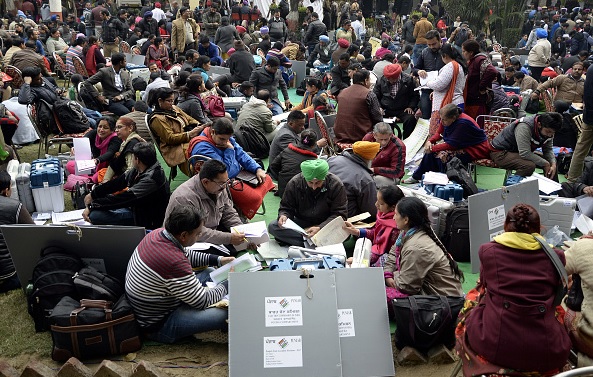
Election season in India has proved to be very fruitful for the ruling Bharatiya Janata Party (BJP), which took four out of the five states it was contesting: Uttar Pradesh (UP), Manipur, Goa, and Uttarakhand. However, the Indian National Congress was able to win Punjab, with 77 of 117 seats. What aided Congress, which has been on the decline since the 2014 general elections, in winning Punjab? And what led to BJP’s defeat in the state?
The Shrimoni Akali Dal (SAD)-BJP alliance failed in Punjab for three reasons. First, the ‘Hindutva’ card played by the BJP in other states couldn’t spell its magic in Punjab. Second, for the first time, Punjab witnessed a triangular contest, with the presence of the Aam Aadmi Party (AAP) besides Congress and SAD-BJP. AAP split the Akali vote and the SAD-BJP alliance suffered. Third, several polls had predicted that the alliance wouldn’t be able to score in the double digits because of the issues that have continued to plague Punjab during its rule. Voters were unhappy with the Akalis because of three broad reasons: the party’s inclination towards the Dera Sacha Sauda to secure Dalit votes, the party’s failure to punish the perpetrators who desecrated the holy Guru Granth Sahib, and drug trade from across the border.
When compared with previous elections, it seems that the Congress largely retained the support of its base, with its vote share decreasing 1.5-2 percent. The worst performance was by the Akalis, whose vote share went down by almost 10 percent. However, it should be noted that Punjab has never voted for the same party twice in a row, and it was the first time in the history of Punjab politics that the same alliance ruled the state for 10 years.
Anti-incumbency helped the Congress win. The Congress’ campaign targeted issues of crucial importance to voters: the illicit drugs trade, unemployment, the inability to curb farmer suicides, and the Satluj-Yamuna Link Canal issue. Moreover, AAP’s failure to project a strong Punjabi leader also helped the Congress win. Voters desired a stable government and an approachable Punjabi leader to feel regionally connected.
Thus, the failure of the Akalis and the introduction of a third party facilitated Congress’ victory. BJP’s unappealing message and Punjabi disenchantment with the SAD contributed to BJP-SAD’s loss in Punjab.
However, the failure in Punjab will not impact the BJP. The party has claimed four out of five states, scoring a massive victory in UP and Uttarakhand. Winning UP is politically significant for any party given the size of the state. Also, it was particularly challenging for the BJP to win in these states given the competition it faced from established regional parties. Thus, being in power where it is and winning these state elections suggests that the BJP will most likely win the 2019 general elections. If future state elections do not go in favor of the BJP, Congress’ win in Punjab could be seen as a turning point. But as of now, BJP is basking in the glory of UP, Manipur, Goa and Uttarakhand, and is on course for victory in 2019.
***
To read more analysis on India’s recent state elections, click here.


